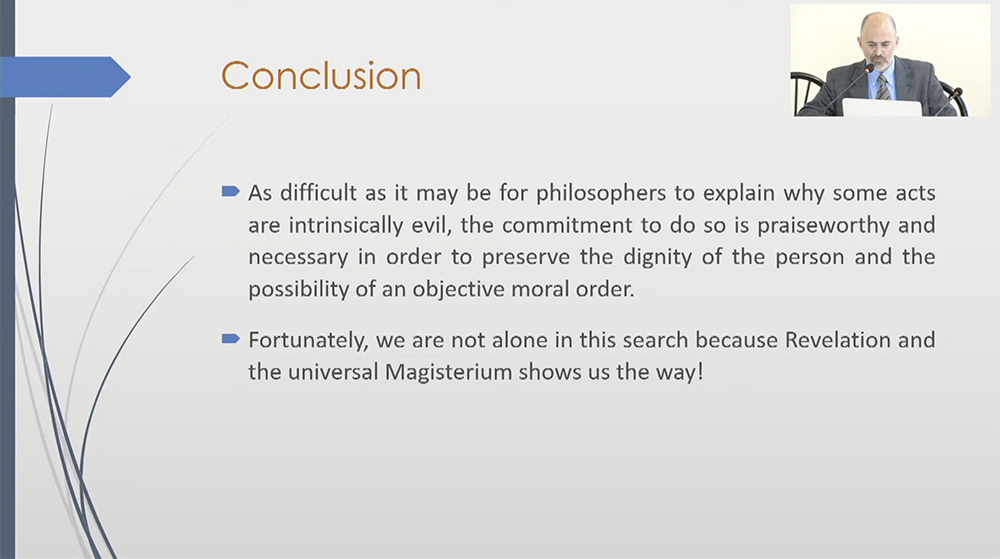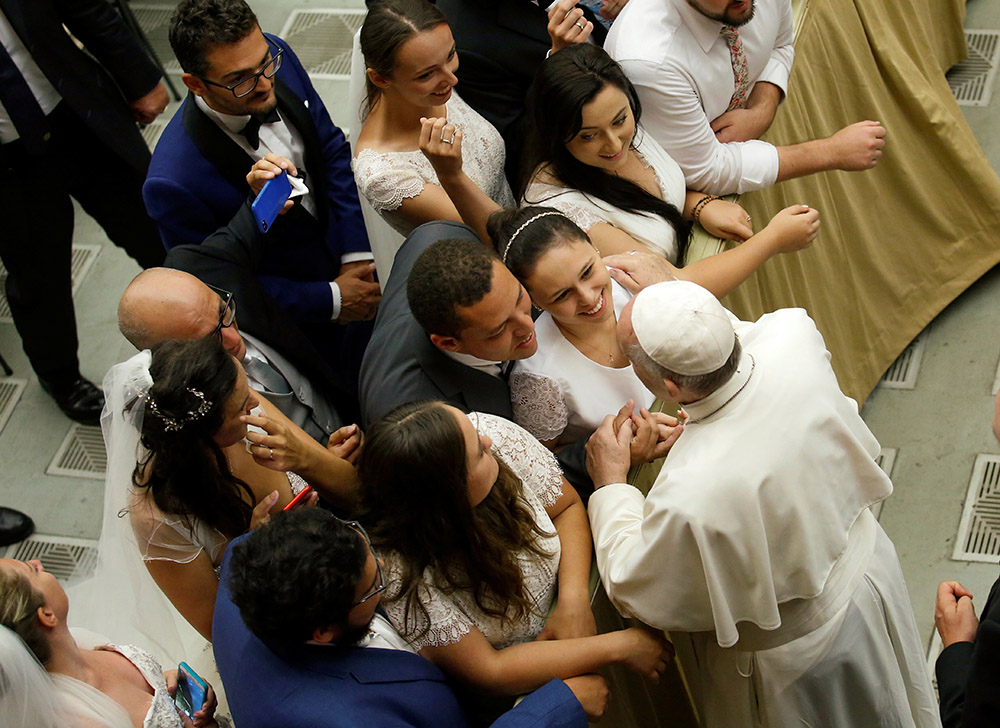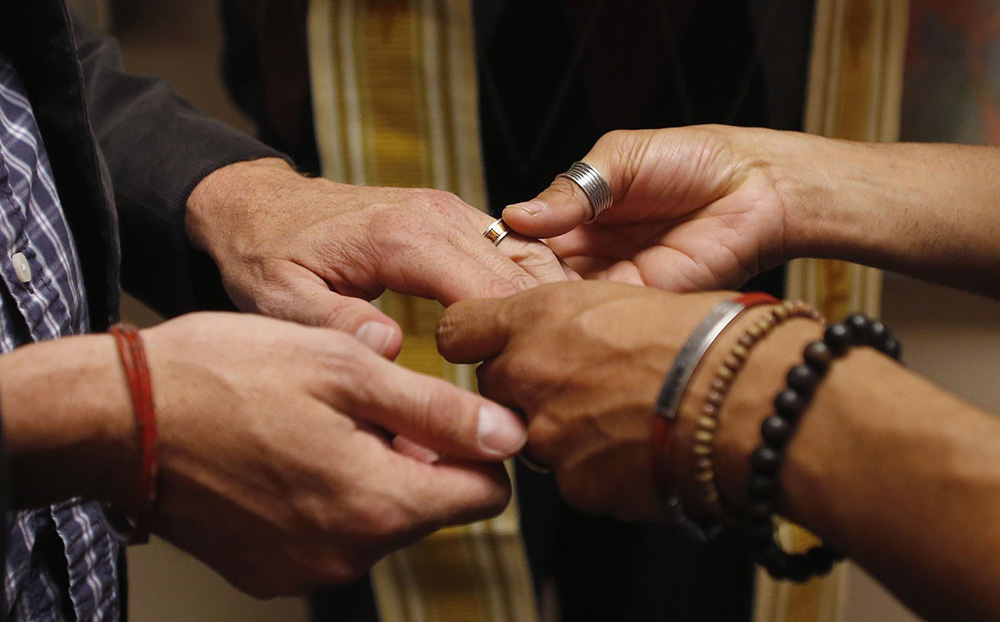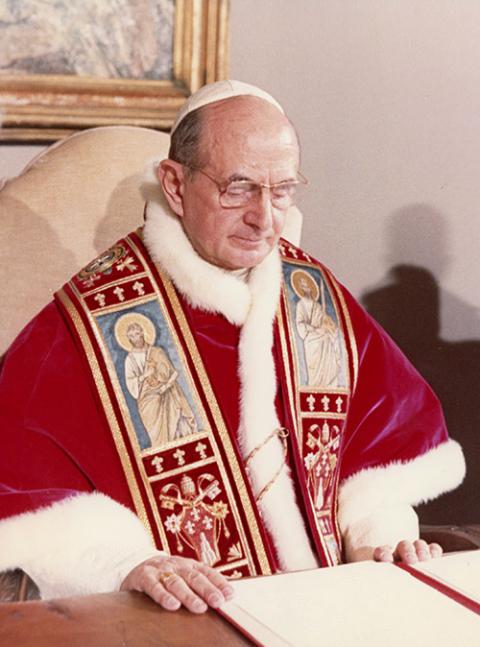
(Unsplash/Jonathan Borba)
Last summer, the Vatican's Pontifical Academy for Life prompted controversy in some Catholic circles with the publication of a book that contained essays challenging church teaching on contraception and other sexual ethical issues. A later tweet on the academy's official Twitter account, which has since been deleted, suggested that Pope Paul VI's encyclical Humanae Vitae, which enacted an absolute ban on artificial contraception, was not an infallible teaching and is, therefore, subject to change.
The response from conservative Catholics, on social media and elsewhere, was swift and negative, with some accusing the academy of waging a campaign meant to overturn church teaching on contraception. Dominican Fr. Thomas Petri, president of the Dominican House of Studies in Washington, D.C., argued that the teaching is "irreformable" and thus not subject to change.
Some U.S. institutions, such as Ave Maria University and the Ethics and Public Policy Center, helped sponsor an entire conference dedicated to opposition to the academy's publication. Hosted by the International Catholic Jurists Forum, the conference was held in Rome in December 2022 and featured speakers who offered scathing critiques of the academy and its publication.
Fulvio Di Blasi, an Italian Catholic ethicist and lawyer, called the document "embarrassing" and asserted there was a "conspiracy" and "clear strategy to overturn the previous magisterium." He claimed that some theologians who contributed to the volume were trying to morally justify contraception, homosexual relations and reproductive technologies by changing "the paradigm of moral theology."

Fulvio Di Blasi speaks Dec. 8, 2022, during a conference hosted by the International Catholic Jurists Forum in response to a recent publication from Vatican's Pontifical Academy for Life. (NCR screenshot)
"It looks like, sometimes, the entire work of some people in the church is to justify homosexual sex, which is really ugly. I say 'ugly' because in classical ethics, good and beautiful go together, so there is an attraction to what is good," Di Blasi said.
The academy defended both its publication and the opponent's conference, noting that it is the responsibility of a pontifical academy, especially in light of Pope Francis' synodality, to facilitate dialogue between and among experts with different opinions.
So why are conservatives so vehemently defending Humanae Vitae? We believe it goes beyond the issue of contraception.
Infallible history
First, we must look at whether Humanae Vitae is indeed infallible. Infallibility can be exercised in two ways. The first was established at the First Vatican Council (1869-70), where an extraordinary exercise of papal infallibility was defined as the pope declaring a doctrine ex cathedra (from the chair). That has only happened once, when Pope Pius XII declared the dogma of the Virgin Mary's assumption into heaven in 1950.
The second exercise of infallibility, explained in Lumen Gentium, is the infallibility of the ordinary and universal magisterium. Such infallibility occurs when bishops, "even though dispersed throughout the world but preserving for all that amongst themselves and with Peter's successor [the pope] the bond of communion, in their authoritative teaching concerning matters of faith and morals, they are in agreement that a particular teaching is to be held definitively and absolutely."
No one claims that the doctrine on contraception in Humanae Vitae was ever defined ex cathedra. The authoritative question, then, revolves around whether it was declared infallible by the ordinary and universal magisterium.
The process by which Humanae Vitae came to be in 1968 is an important part of its history. At the instigation of Belgian Cardinal Leo Suenens, whose ultimate intent was that an adequate document on Christian marriage be brought before the Second Vatican Council (1962-65) for debate, Pope John XXIII established a commission to study the issue of birth control. The commission was confirmed and enlarged by Pope Paul VI until it ultimately had 71 members.
In the commission's final vote on the question of whether contraception was intrinsically evil, nine bishops responded no, three responded yes, and three abstained. Nine bishops also voted in agreement with the commission's majority report, which approved the use of contraception to regulate fertility in certain situations. Given the votes of the commission's bishops, it is an incredible stretch of the imagination and dishonors the consciences of the bishops to claim that the ordinary universal magisterium declares this teaching irreformable.
Theologians who advised the commission were likewise divided. Fifteen did not see contraception as intrinsically evil and a violation of the natural law; four did.
Yet Paul VI was unconvinced by the arguments of the majority and shared the concern of the minority that the church could not repudiate its long-standing teaching on contraception without undergoing a serious blow to its overall moral authority. So he approved the minority report in his encyclical letter Humanae Vitae.
The minority report argued that "each and every marriage act must remain open to the transmission of life." The majority report argued that marriage itself, not each and every marriage act, is to be open to the transmission of life.
The debate on the authority of the teaching on contraception has been settled by the practical judgment of the vast majority of Catholic couples.
The two positions reflect two different models of marriage: The traditional procreative model focused on the "natural" outcome of the act of sexual intercourse; the majority report was based on the new interpersonal union model that emerged from the council that focused on the total meaning of marriage and of sexual intercourse within the marriage relationship.
The interpersonal model continues to be the judgment of the majority of Catholic theologians and the vast majority of Catholic couples. Fifty-five years later, despite a concerted minority effort, led by Pope John Paul II and, more recently, the International Catholic Jurists Forum, to make adherence to Humanae Vitae a standard of authentic Catholicity, the debate between the procreative and interpersonal models perdures as a source of unnecessary division in the church called to communion.
The debate on the authority of the teaching on contraception has been settled by the practical judgment of the vast majority of Catholic couples and by many priests and bishops who opt for a pastoral approach to applying the norm of Humanae Vitae. In Amoris Laetitia, Francis teaches that while natural means for fertility regulation, the only morally acceptable form of fertility regulation allowed by official church teaching, are to be "promoted," the married couple themselves must decide in conscience, before God.
Nowhere in Amoris Laetitia does Francis cite Humanae Vitae's absolute condemnation of artificial contraception, which he would certainly have done if this was an infallible teaching. Instead, following traditional Catholic teaching, he promotes responsible parenthood and the authority and inviolability of a well-formed conscience, citing Gaudium et Spes.
Advertisement
New pastoral methods
In justifying disagreement with (not conspiracy against, as the International Catholic Jurists Forum suggests) magisterial teaching against artificial contraception, the Pontifical Academy for Life and other theologians are using a new moral paradigm or what Francis calls in Amoris Laetitia "new pastoral methods" that "respect both the Church's teaching and local problems and needs."
These new methods acknowledge the distinction between moral and pastoral theology, between objective and subjective morality. The former emphasizes objective norms and magisterial teaching; the latter emphasizes pastoral guidance and subjective conscience.
Although, as theologian Norbert Rigali notes, there is only a single moral truth, the moral truth exists only in the subject. Francis seems to defend this kind of prioritization of the moral subject and her/his conscience when he teaches in Amoris Laetitia that the church has "been called to form consciences, not to replace them."
New pastoral methods also reflect an integration of Catholic social and sexual teaching. Catholic social ethics has been largely principle-oriented, relational-focused, dynamic, developmental and inductive; Catholic sexual ethics continues to be largely law-oriented, legalistic, act-focused, static and deductive. The integration of both marks a profound shift in Catholic theological ethics.

Pope Francis greets a group of newlyweds during his general audience in Paul VI hall at the Vatican Aug. 21, 2019. (CNS/Reuters/Remo Casilli)
In Amoris Laetitia, Francis introduced an ethical paradigm shift by integrating Catholic sexual and social ethical methods and relying heavily on the insights of experience, synodality, and the biological and social sciences. This shift from a deductive, absolutist, one-size-fits-all Catholic sexual teaching is profoundly illustrated in Francis' citation of Thomas Aquinas' Summa Theologiae for the first time ever in an official church document.
"Although there is necessity in the general principles," Aquinas judges, "the more we descend to matters of detail, the more frequently we encounter defects. ... In matters of action, truth or practical rectitude is not the same for all, as to matters of detail, but only as to the general principles; and where there is the same rectitude in matters of detail, it is not equally known to all… The principle will be found to fail, according as we descend further into detail."
This passage suggests an ethical paradigm shift in Catholic sexual ethics, which has profound implications for Catholic sexual teaching.
Crumbling foundation
Why are some Catholics so insistent on defending Catholic teaching against artificial contraception that the faith and practice of most Catholic couples have largely rejected, and that faithful, credible, mature and adult Catholic theologians have thoroughly deconstructed?
The answer in large part, we believe, lies in the realization that once the church recognizes the flaws in Humanae Vitae's foundational principle, the entire edifice of official Catholic sexual teaching crumbles.
In relational terms, permanently infertile heterosexual and same-sex couples are capable of openness to the transmission of life, the life of their personal unions rather than the life of a new biological being.
The foundational principle to justify absolute prohibition of contraception is the inseparability principle, which asserts "the inseparable connection, established by God, which man on his own initiative may not break, between the unitive significance and the procreative significance which are both inherent to the marriage act," in the words of Humanae Vitae.
If the inseparability principle is demonstrated to be false, which has indeed been demonstrated now by countless scholars using sound exegesis, science, experience and a proper reading of tradition, then the entire basis for defending other sexual norms crumbles.
This principle, however, is actually a revision of marital and moral theology from before 1968. It is in direct contradiction to Pope Pius XII's teaching that allowed for the intentional practice of the rhythm method to regulate fertility by, de facto, separating the two meanings of the marital act and preventing pregnancy, even for the duration of the marriage, for "serious reasons." The claim that there is a moral distinction between the intentions of the approved rhythm method or natural family planning and banned artificial contraception, both of which intend to prevent pregnancy, is disingenuous, counterintuitive and morally unjustifiable.

A same-sex couple exchange rings during a ceremony in Salt Lake City. (CNS/Reuters/Jim Urquhar)
For infertile and post-menopausal couples, and for all fertile women during the majority of days of their fertility cycle, there is no procreative meaning to the act of sexual intercourse. One reason Catholic teaching condemns homosexual acts is that such acts "close the sexual act to the gift of life," in other words, they violate the procreative meaning of the sexual act. Both gays and lesbians are naturally sexed human beings and their sexual activity is as incurably infertile as the acts of permanently infertile married heterosexuals, which the Catholic Church recognizes as legitimate and ethical.
Openness to the transmission of life in biological terms, then, is morally meaningless when it is impossible for permanently infertile heterosexual couples to biologically reproduce.
In relational terms, however, permanently infertile heterosexual and same-sex couples are capable of openness to the transmission of life, the life of their personal unions rather than the life of a new biological being.
Once magisterial teaching recognizes this incontrovertible scientific and experiential fact, the inseparability principle no longer holds, and the moral arguments based on this principle to prohibit contraceptive, homosexual and artificially reproductive acts crumble.
Di Blasi claims that it is essential "to spend some time to fix this debate so we can move forward." We wholeheartedly agree that we need to fix this debate and move forward. We insist, however, that we must move forward in a way that recognizes the truth of an integrated Catholic sexual and social teaching, shaped by human experience and just and loving relationships, not by a discounted, fearful teaching that has no bearing or relevance for the faithful.





